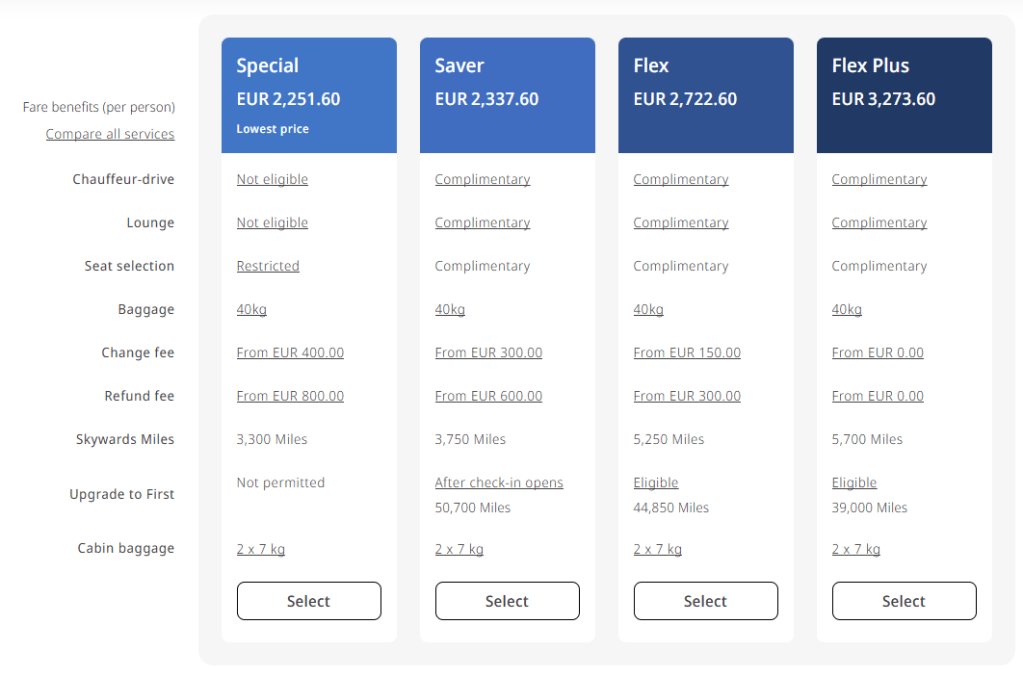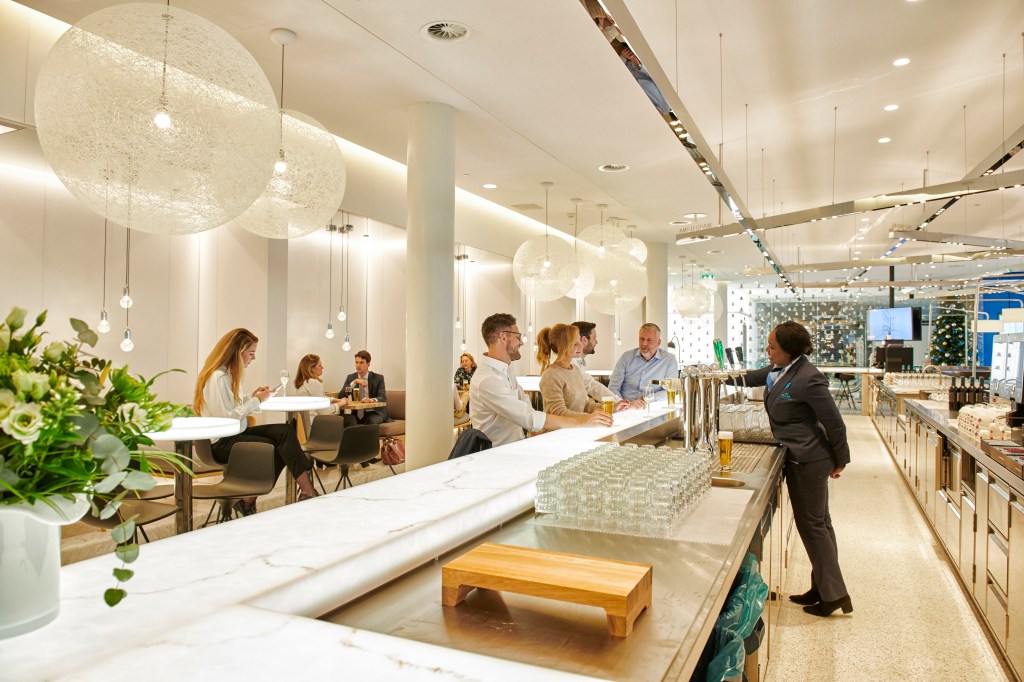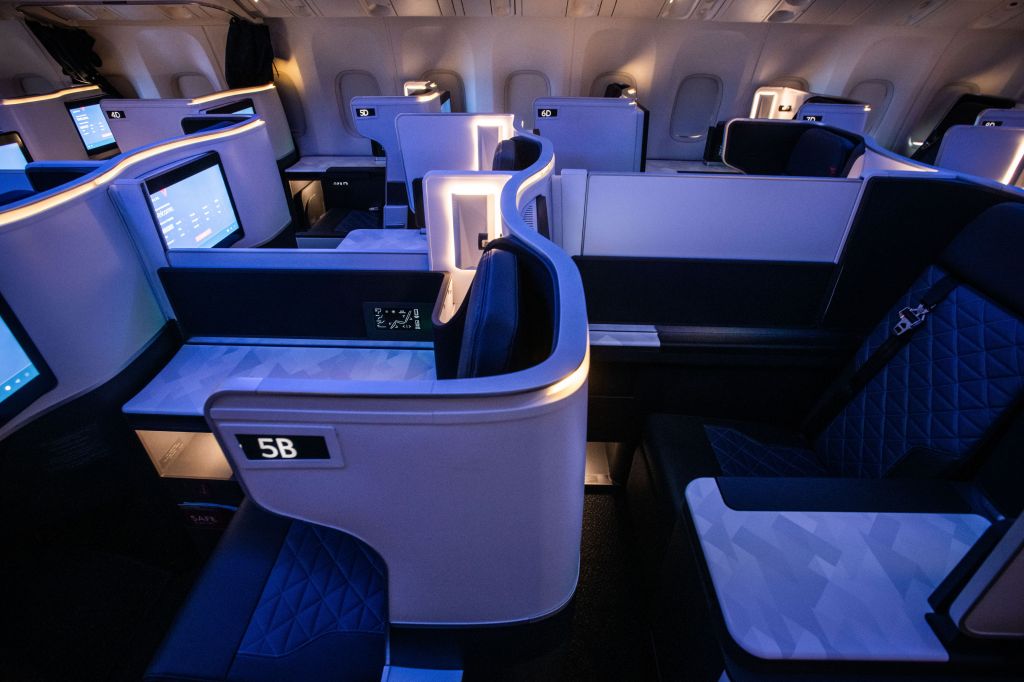Stripping Business Class Bare: The Rise and Risks of No-Frills Premium Travel

Skift Take
Airfares aren’t what they used to be. Features once taken for granted are fast becoming optional add-ons.
In the 2010s, the checked bag and even the humble carry-on disappeared from the main ticket price at many airlines. Today, seat reservations, in-flight refreshments, and the privilege of not being the last person to board the plane often come for an extra fee.
Initially just for economy class tickets, the unbundling of fares is now gaining traction in premium cabins. A rare beacon of luxury in the world of modern aviation, business class perks are no longer a given – think checked luggage, access to airport lounges, and even choosing a seat.
Etihad is the latest airline to announce changes to its business class ticket structure. Last month, it modified its premium fares to create three categories: Value, Comfort, and Deluxe.
As the name suggests, Value is the most basic option. It does away with free seat reservations, lounge access, and the Etihad chauffeur service. The airline says this “allows more choice to our valued guests,” and boosts flexibility for varying travel needs.
With Delta and others also reportedly considering unbundled options, is this the end of business class as we know it?
A Broader Unbundled Trend
Etihad's changes are notable, but it certainly wasn’t the first. Qatar Airways, Air France, and KLM are among the other big name brands to offer basic business class options.
There’s disagreement in industry circles about who was the first to strip back business class to its bare bones, but many argue it was Emirates.
In 2019, the Dubai-based carrier introduced a ‘Business Special’ fare. This is typically 5-15% cheaper than a regular ticket, however it doesn’t include perks like a chauffeur, lounge access, or early seat selection. It is available on select routes and subject to availability.

Finnair has also been experimenting with the format for several years. The 2021 introduction of its Business Light fare is “designed especially for leisure travelers who want to travel light and affordably while enjoying Business Class comfort.”
Described as “brutal” by one industry observer, the ticket does not allow business class passengers to check in a bag – even on ultra-long-haul flights.
Unbundling Fatigue?
With fare unbundling now a reality for economy and premium passengers alike, there is a risk that some customers feel fatigued, or even hard done by.
“I don’t like these select service concepts for Business Class tickets,” wrote Sebastian Powell at Loyalty Lobby in his post about Etihad’s recent changes. “Airlines shouldn’t be cheap and try to lowball their premium customers. It’s not like tickets suddenly get cheaper because of this, it’s a cutback!”
That’s not how the airlines tell it.
They point towards greater flexibility for business class passengers, many of whom already have perks such as lounge access offered through loyalty program status. Others choose to travel with hand luggage only for short work trips and welcome the opportunity to pay less for services they don’t need.
The risk comes when customers wrongly assume that every business class ticket comes with all the bells and whistles.
“Airlines are banking on the fact that regardless if you are traveling for business or pleasure, premium seating comes at a hefty price tag, so why wouldn’t you want to save?” says travel expert Katy Nastro of Going, formerly Scott’s Cheap Flights.
Paring Back the Perks
Other carriers are beginning to take notice. Delta, for example, hinted at a “basic business” class last year.
Airlines are “positioning this as travelers are given back the ‘choice’ to add what they want or needs,” says Nastro. “More people, not just business travelers, are entertaining spending more to get a better experience, yet there is a threshold at which some people will say, ‘Well, for only X amount more I can get all of these benefits’ — which is where airlines are hoping they will make the jump into the higher fare.
“It’s not entirely clear what the average saving is between a basic business to a regular business class seat but at the end of the day, it’s up to the traveler – and their corporate budgets – to decide what type of experience is worth it,” she adds.
For all of the industry column inches criticizing the concept, it does have its plaudits.
Industry blog Cranky Flier wrote about Emirates unbundling premium fares — and didn’t hate the idea: “I generally don’t care about all the fluff. In fact, I wish it would go a step further and allow you to save even more money by opting out of meals — or opting into coach meals — instead. For me, the big benefit of business class is the seat. The rest I don’t care much about. So give me that option for less money, and I’ll be happy. The full service option will always be there for those who care.”

Are Airlines Diluting Their Brand?
Still, some urge caution. "The global network carriers continue to promote themselves as premium airlines," Jay Sorensen, president of the airline consultancy IdeaWorks, told The Points Guy last July, shortly after Delta trailed a “basic business” fare. "When you behave like a [low-cost carrier], your brand will eventually become an LCC, and your employees will take on LCC-like habits."
Sorensen expanded his theory further in an interview this week with Skift: “I believed that business class (and first class) would be immune to the a la carte approach,” he said. “This product has traditionally been an 'all in' offer with airlines eager to best each other by adding more amenities and improving the product. There's plenty of evidence of airlines going for short-term revenue gains at the expense of brand definition. We have the three U.S. majors selling basic economy, which offers a low-cost-airline experience.”
Now, says Sorensen, even the online booking experience implies doubt. “Their sales effort includes an in-path warning that pops up when basic economy is purchased. It asks, ‘Are you certain you want to buy this?’ That's the most awkward question a retailer can ask. Imagine being in a store, selecting a product off the shelf, and a clerk walks up and asks the same question. It makes one wonder why the product is on the shelf.”
A Helpful Hotel Comparison
To put it another way, Sorensen describes the concept as similar to a hotel blending its service styles by incorporating a Holiday Inn Express into an InterContinental hotel.
“It might make for a grand Holiday Inn Express experience, but it certainly would detract from the exclusivity for those seeking ultra luxury at the InterContinental. Now imagine staff from both brands operating interchangeably within the building: a free buffet breakfast host one day, and a Club lounge concierge the next. It would be a monumental effort to prevent a blending of service styles.
“But in the metal tube we call an airplane, airlines attempt the same outcome with nothing but a curtain separating very different product experiences,” Sorensen adds. “The challenge becomes bigger when ‘some’ passengers in business are not treated the same as others.”
Could the U.S. be Next?
Etihad is unlikely to be the last to adopt the new strategy – and like so many things in the airline industry, its continuation is almost guaranteed to have a ripple effect.
Nastro notes that the unbundling trend for premium fares shows no sign of slowing down: “We have heard rumors from Delta that they would be exploring an unbundled basic business class seat since last year, but no details or formal announcement has been made on when or on how exactly that would look.”
Asked by Skift for a progress update on its strategy, a Delta spokesperson said the carrier doesn’t currently have anything to share beyond what was outlined in its investor day presentation.
In the meantime, the industry is watching and waiting: “One thing we do suspect is that if Delta fully takes the plunge, we could see United and American also jumping in the same pool,” says Nastro.

It’s not just North American carriers who will be diving into the trend, suggests Sorensen: “I believe the trend of a la carte in business will grow. I'm always amazed by the lemming aspect of this industry: Airlines easily embrace something which generates more revenue, with little regard for the impact on customers and employees. Witness the overwhelming adoption of seat assignment fees, which has been combined with a crazy reluctance to automatically refund them when a flight is changed and the extra leg room seat is no longer available.”
Examining Cost vs. Value
Some industry watchers argue that a bare bones business class is the next step forward for airlines that prioritize cost above passenger experience.
“That's the stuff that invites regulators to become involved in our business — and that never has a good outcome for anyone,” argues Sorensen.
“All companies should do the hard work of defining its brand, and making decisions that support that definition. Too often, branding is defined by the advertising folks, with product decisions being based upon revenue alone.”
As more airlines pick up on the trend, Sorensen doesn’t see great returns for the companies who embrace it: “Basic economy for American, Delta, and United, is an example where ‘practice and product’ defines the brand, rather than the brand defining itself.
"It conflicts with these carriers' profound desire to be known as premium airlines. The a la carte method is good when it aligns with a carrier's brand. Make no mistake, going the a la carte route in business class will affect an airline brand."
Airlines Sector Stock Index Performance Year-to-Date
What am I looking at? The performance of airline sector stocks within the ST200. The index includes companies publicly traded across global markets including network carriers, low-cost carriers, and other related companies.
The Skift Travel 200 (ST200) combines the financial performance of nearly 200 travel companies worth more than a trillion dollars into a single number. See more airlines sector financial performance.




